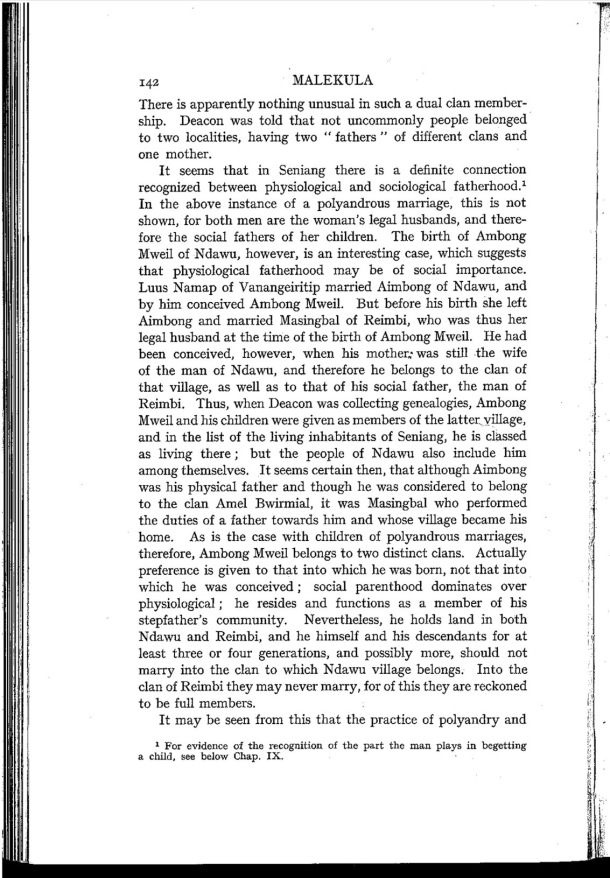|
|  [Note: this transcription was produced by an automatic OCR engine]
I42 MALEKULA
There is apparently nothing unusual in such a dual clan member-
ship. Deacon was told that not uncommonly people belonged
to two localities, having two "fathers â€ù of different clans and
one mother.
It seems that in Seniang there is a deï¬Ånite connection
recognized between physiological and sociological fatherhood.‘
In the above instance of a polyandrous marriage, this is not
shown, for both men are die woma.n’s legal husbands, and there-
fore the social fathers of her children. The birth of Ambong
Mweil of Ndawu, however, is an interesting case, which suggests
that physiological fatherhood may be of social importance.
Luus Namap of Vanangeiritip married Ainibong of Ndawu, and
by him conceived Ambong Mweil. But before his birth she left
Aimbong and married Masingbal of Reimbi, who was thus her
legal husband at the time of the birth of Arnbong Mweil. He had
been conceived, however, when his mother; was still the wife
of the man of Ndawu, and therefore he belongs to the clan of
that village, as well as to that of his social father, the man of
Reimbi. Thus, when Deacon was collecting genealogies, Ambong
Mweil and his children were given as members of the lattenvillage,
and in the list of the living inhabitants of Seniang, he is classed
as living there; but the people of Ndawu also include him
among themselves. It seems certain then, that although Airnbong
was his physical father and though he was considered to belong
to the clan Amel Bwirmial, it was Masingbal who performed
the duties of a father towards him and whose village became his
home. As is the case with children of polyandrous marriages,
therefore, Ambong Mweil belongs to two distinct clans. Actually
preference is given to that into which he was born, not that into
which he was conceived; social parenthood dominates over
physiological; he resides and functions as a member of his
stepfather’s community. Nevertheless, he holds land in both
Ndawu and Roimbi, and he himself and his descendants for at
least three or four generations, and possibly more, should not
marry into the clan to which Ndawu village belongs. Into the
clan of Reimbi they may never marry, for of this they are reckoned
to be full members.
It may be seen from this that the practice of polyandry and
1 For evidence of the recognition of the part the man plays in begetting
1 child, see below Chap. IX. »
|